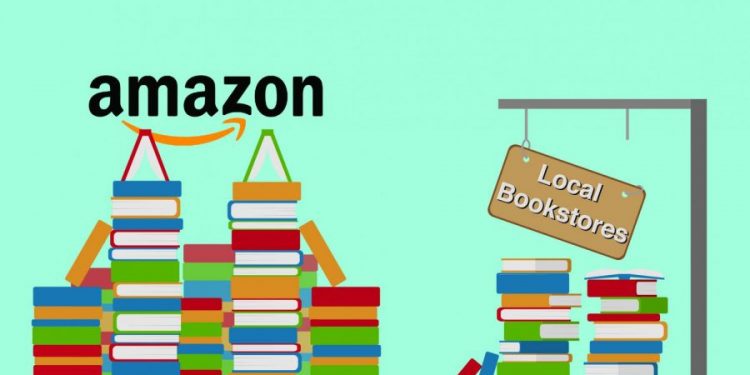There is a little place in my hometown in New Jersey that has always been my escape from the rest of the world. Squished between a smoothie bowl chain and an awning shop sits the Bookateria, a secondhand bookshop crammed with paperbacks on topsy-turvy shelves. Though the shop hardly takes up more space than my tiny college dorm room, it feels like a world unto itself. With so many stories surrounding me in that little shop — and a kind face behind the counter to recommend the best ones — I could not ask for anything more.
I think most readers can point to their own Bookaterias: small, independent bookshops that have embraced them and fostered their love of reading. These shops hold unique places in our hearts and memories. If so, why do we fork over tens of hundreds of dollars to the faceless bookselling behemoth, Amazon, while the small bookstores in our own communities struggle quarter-to-quarter?
I could spend pages and pages talking about the environmental destruction and unsafe working conditions that make Amazon the last corporation you should support. Still, you have likely already heard about that. However, you may not often think about the small businesses that suffer when you select One-Click Ordering and send a copy of the latest bestseller to an on-campus Amazon locker.
This summer, I wrote a blog called The Bookshop Project. Each week, I interviewed small business owners — booksellers specifically — who had seen their shops impacted by COVID-19. I began each interview with the same prompt: Describe your shop’s atmosphere. The answers were as unique, diverse and beautiful as the communities from which these shops originated. I heard of cozy nooks in Wisconsin strip malls, summer nights in Old City Philadelphia where a lazy breeze floated through open shop doors, a South Carolina shop dedicated to promoting books by Black authors and a children’s books-specialized shop in Cincinnati that donates a book to a child in the local community for every purchase. These vivid portraits of bookshops across the country prove that booksellers have one important quality in common: they are the beating hearts of their communities. Sure, people gather in bookshops to purchase books, but so much more happens in these little treasure troves of culture. Children discover a lifelong love of reading. Adults make new friends in a world increasingly characterized by isolation. Local authors share their stories and give back to the community that raised them. People connect. A bookshop brings a community together in a way that no Amazon fulfillment center or corporate headquarter can.
Even throughout the COVID-19 crisis, bookstores have found creative ways to bring their communities together. Many have hosted authors on virtual book tours through live-streamed events, bringing new stories and perspectives to more readers than ever before. I attended one of these events, an interview with author Madeline Miller hosted by Brooklyn bookseller Books Are Magic, back in May. Even confined to my house in quarantine, I felt like I had been transported back to New York City listening to Miller’s talk and seeing so many other readers’ names pop up in the chat. Books Are Magic hosted the event free of charge, prioritizing community over profit. Even while separated from their community members by hundreds of miles, Books Are Magic brought us together in more powerful a way than Amazon ever could.
Unfortunately, Amazon continues to grow during the pandemic while independent booksellers struggle. The U.S. government offered loans and grants to struggling small businesses, but the majority of booksellers struggle to secure this money and continue to face dire financial difficulties. Many shut down entirely. In fact, Publishers Weekly maintains a list of cancellations and closures, reporting newly-shuttered independent bookstores each week. With little support from the government, the American Booksellers Association has set up an emergency fund, but applications to receive this money have already closed as the pandemic rages on.
After everything independent booksellers have done for their communities, I believe that it is our responsibility to return the favor and save independent bookstores. Advocate for more robust safety nets for struggling small businesses by calling your congressional representatives and voting for candidates who support such initiatives. Follow independent bookstores on social media and boost their names. And most importantly, stop buying books on Amazon— regardless of convenience— and start buying them directly from your local independent bookstore.
Investing in local bookstores is not only worth sacrificing one-day shipping, but it is also easier and more convenient than you may think. Recently, a small team of book lovers set up Bookshop.org, an online bookstore that gives a percentage of each sale to independent bookstores. Readers can designate their local bookstore to receive the money or opt for that money to go into a general fund that Bookshop.org distributes to all participating booksellers. For audiobook fans who find it difficult to part with Audible, a subsidiary of Amazon, Libro.fm has emerged. Users have the option either to purchase individual audiobooks or to subscribe monthly, similarly to how Audible functions. Like Bookshop, Libro.fm gives a portion of the proceeds of all purchases and subscriptions to the listener’s independent bookstore.
Ultimately, one person’s dollar can only go so far. But to a local independent bookseller, every dollar counts, and every purchase counts. Ordering a book through Bookshop, stopping by your local bookstore, or downloading through Libro.fm may involve an extra step, but that extra step means more to the small businesses in your community than it does to the retail behemoth that is Amazon.
Emma Paolini, FCRH ’21, is an English major and a marketing minor from Medford N.J.





